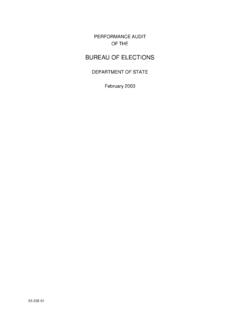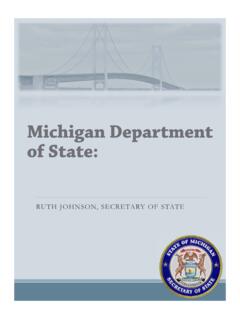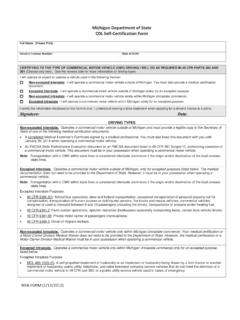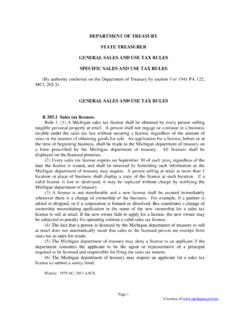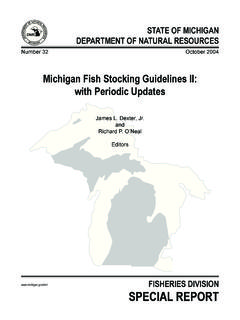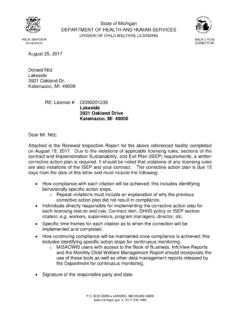Transcription of Michigan Department of Treasury Local Audit and Finance ...
1 Michigan Department of TreasuryLocal Audit and Finance Division4th Floor, Treasury BuildingLansing, Michigan 48922 Phone (517) 373-3227 Copyright 2001-2004 State of MichiganDetermining Lawful ExpendituresThis narrative is intended as a reference for Local government officials,employees and governmental auditors of selected references to the MichiganConstitution of 1963, court decisions, opinions of the attorney general andMichigan statutes that address some of the questionable expenditures of localgovernment. This narrative should not be considered a legal opinion of thestatutes, court decisions or opinions of the attorney general. Please consultyour legal advisor if a legal opinion is PREMISE OF Local GOVERNMENTSome of the basic guidelines and legal restrictions imposed on Local governmentsare summarized in the following legal citations. This listing in not complete,but does highlight the basic restrictive authority granted to Michigan 's localunits of PROVISIONS-- Michigan CONSTITUTION OF 1963(a) Each organized township shall be a body corporate with powers and immunitiesprovided by law (Art.)
2 7, Sec. 17).(b) The legislature shall provide by general laws for the incorporation ofcities and villages. Such laws shall limit their rate of ad valorem propertytaxation for municipal purposes, and restrict the powers of cities and villagesto borrow money and contract debts. Each city and village is granted power tolevy other taxes for public purposes, subject to limitations and prohibitionsprovided by this constitution or by law (Art. 7, Sec. 21).(c) Under general laws the electors of each city and village shall have thepower and authority to frame, adopt and amend its charter, and to amend anexisting charter of the city or village heretofore granted or enacted by thelegislature for the government of the city or village. Each such city andvillage shall have power to adopt resolutions and ordinances relating to itsmunicipal concerns, property and government, subject to the constitution enumeration of powers granted to cities and villages in this constitutionshall limit or restrict the general grant of authority conferred by this section(Art.
3 7, Sec. 22).(d) Except as otherwise provided in this constitution, no city or village shallhave the power to loan its credit for any private purpose or, except as providedby law, for any public purpose (Art. 7, Sec. 26).(e) Any county, township, city, village, authority or school district empoweredby the legislature or by this constitution to prepare budgets of estimatedexpenditures and revenues shall adopt such budgets only after a public hearingin a manner prescribed by law (Art. 7 Sec. 32)(f) The provisions of this constitution and law concerning counties, townships,cities and villages shall be liberally construed in their favor. Powers grantedto counties and townships by this constitution and by law shall include thosefairly implied and not prohibited by this constitution ( , Sec. 34).(g) The credit of the state shall not be granted to, nor in aid of any person,association or corporation, public or private, except as authorized in thisconstitution (Art.
4 9, Sec. 18). (NOTE: The Supreme Court in the decision ofBlack Marsh Drainage District v. Rowe [1958], 350 Mich. 470, held that thisprovision applies to all political subdivisions of the state.)(h) Neither the legislature nor any political subdivision of this state shallgrant or authorize extra compensation to any public officer, agent or contractorafter the service has been rendered or the contract entered into (Art 11, ).SUPREME COURT DECISIONS(a) Local governments have no inherent powers and possess only those limitedpowers which are expressly conferred upon them by the State Constitution orState statutes or which are necessarily implied therefrom (Hanselman v. Killeen[1984] 419 Mich. 168).(b) A county is a municipal corporation and possesses only those powers whichhave been conferred upon it by the Constitution and the statutes (Mosier v. Auditors 295 Mich.
5 27, 29).(c) Local units of government derive their powers of taxation from thelegislature and such power cannot be exercised except in pursuance of expressstatutory authority (City of Berkley v. Township of Royal Oak [1948] 320 ).OPINIONS OF THE ATTORNEY GENERAL(a) Appropriation of township funds which is not expressly authorized ornecessarily implied with express statutory powers is unlawful whether with orwithout a vote of the township electors (Opinion of the Attorney General,1955-56,No. 1704, page 32). The general belief is that an illegal or unauthorizedexpenditure of governmental funds by any Local governmental unit can not bechanged to a legal or authorized expenditure by a vote of the electors.(b) City funds may not be used for contributing to the expenses of privatevoluntary groups operating recreation facilities for children (Opinion of theAttorney General, 1957, No.
6 3066, page 476).(c) Village has no authority to appropriate public funds for lighting arecreation field controlled by a veterans' organization even though theentertainment provided therein were free to the public (Opinion of the AttorneyGeneral, 1935-36, page 5).(d) Since money can be raised by a township only for township purposes, townshipcannot pay part of the expenses of a county children's worker (Opinion of theAttorney General, 1947-48, No. 694, page 574).(e) Appropriation of money by township for construction, improvement ormaintenance of state trunk lines is ultra vires and such spending ismisappropriation of funds (Opinion of the Attorney General, 1952-54, No. 1738,page 285).These legal citations specify that a Local government unit and the officials oflocal governments have only those duties specifically granted to them by theMichigan Constitution and statutes.
7 If the action to be taken is notspecifically authorized by the Constitution, a statute, court decision or legalopinion, that action can not be legally specified in a Local unit's Charter or Ordinance, legally adopted byvote of the electorate or approved by the legislative body after publication,must be followed when those procedures are more restrictive than the Budget ProvisionsMichigan Compiled Law (MCL) section requires that a public hearing beheld on the proposed budget prior to the legislative body formally adopting thebudget. The time, date and location of the public hearing must be published atleast six days prior to the hearing. Copies of the proposed budget must beavailable for public inspection from the date the notice of the public hearingis published and budget procedures for charter townships are required by MCL Charter township budgets must be adopted at least 60 days priorto the start of their fiscal year and after a public hearing notice published atleast 7 days prior to the date of the public budget hearing.
8 Cities and Villagesmay have Charter Provisions or Local Ordinances requiring specific budgetaryprocedures. The Local procedures must be followed when they are more restrictivethan the general et "Uniform Budgeting and Accounting Act"--requires a localunit to adopt a General Appropriation Act (approved budget) after a can not exceed the amount authorized in the Appropriation Actunless the Local Appropriation Act is amended. Expenditures can not beauthorized unless that are provided for in the Appropriation can not be authorized that exceed the amount appropriated or inexcess of the available funds as that action creates a debt against the unit ora deficit within the Appropriation Act may include a narrative authorizing the fiscal officer tomake transfers between activities, cost of personnel, capital outlay or otherbudgetary action authorized by the legislative expenditures in excess of or contrary to the Appropriation Act(budget)can be recovered by civil proceedings brought by the Attorney General orprosecuting attorney (MCL ).
9 Any budgetary procedure specified in a Charter or Ordinance of a Local unit thatis more restrictive than the general statute must be Claims--vendor billsCITIES (MCL ) All claims against the city shall be filed with the clerk foradjustment, and after examination thereof, the clerk shall report the claimswith all accompanying vouchers and counter claims of the city, and the truebalance as found by the clerk, to the council for allowance, and when allowedshall draw the city warrant upon the treasurer for the payment thereof,designating thereon the fund from which payment is to be made.(MCL ) The council shall Audit and allow all accounts chargeable againstthe city but no account or claim or contract shall be received for Audit orallowance, unless it shall be accompanied with a certificate of an officer ofthe corporation (city), or an affidavit of the person rendering it, to theeffect that he verily believes that the services therein charged have beenactually performed or the property delivered for the city, that the sums chargedtherefore are reasonable and just, and that no set-off exists, nor payment hasbeen made on account [MCL (q)] and (MCL ) It shall be the duty of the county boardof commissioners or county auditors to adjust, allow and authorize the paymentof all claims against the county.
10 Any claim not adjusted or ordered paid shallnot be (MCL ) This section authorizes the county board of commissionersin counties with less than 75,000 population to provide by resolution for theappointment of a Finance committee. When the statutory committee is appointed,the Finance committee approves all (MCL ) This section authorizes the county board of commissionersin counties with not less than 75,000 population to provide by resolution forthe appointment of a Finance committee. When the statutory committee isappointed, the Finance committee audits all claims. Approval for payment by thecounty board of commissioners after Audit by the Finance ( ) The township board shall approve claims against the townshipand authorize payment of allowed claims. Paid claims are filed and preserved bythe township clerk. The treasurer shall pay claims upon order of the townshipboard, signed by the (MCL ) Council to Audit and allow all accounts chargeable againstthe village.
